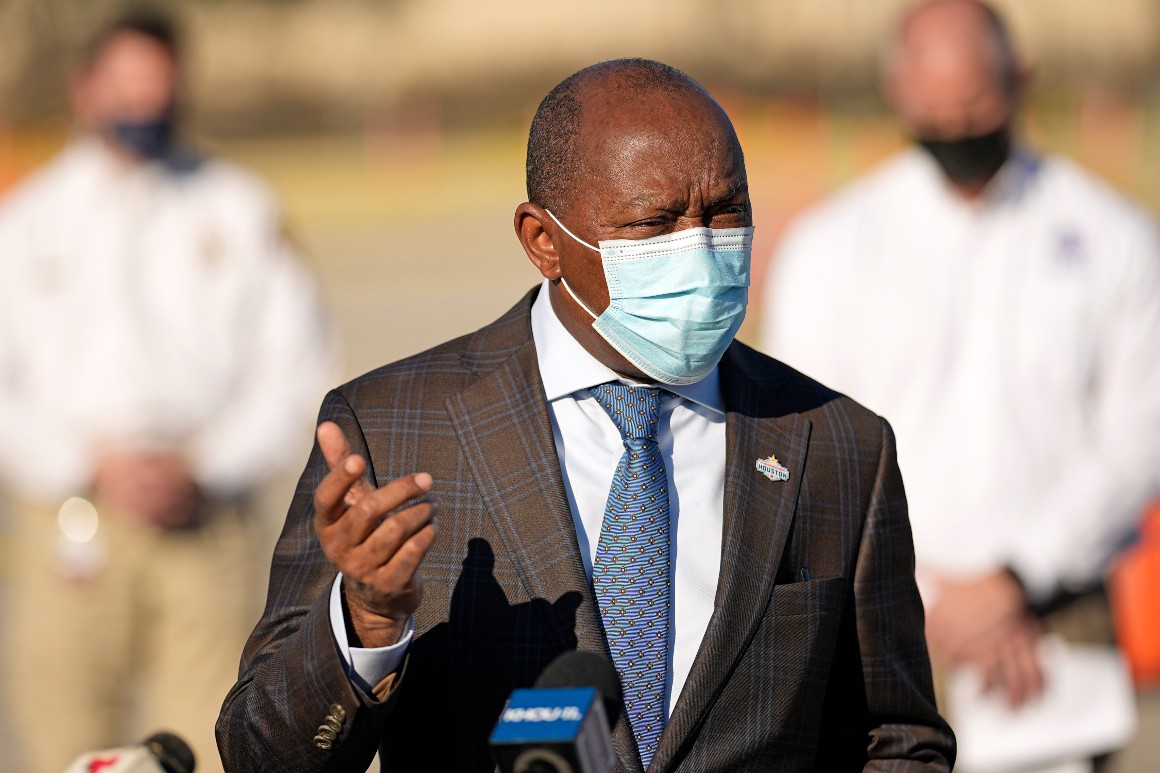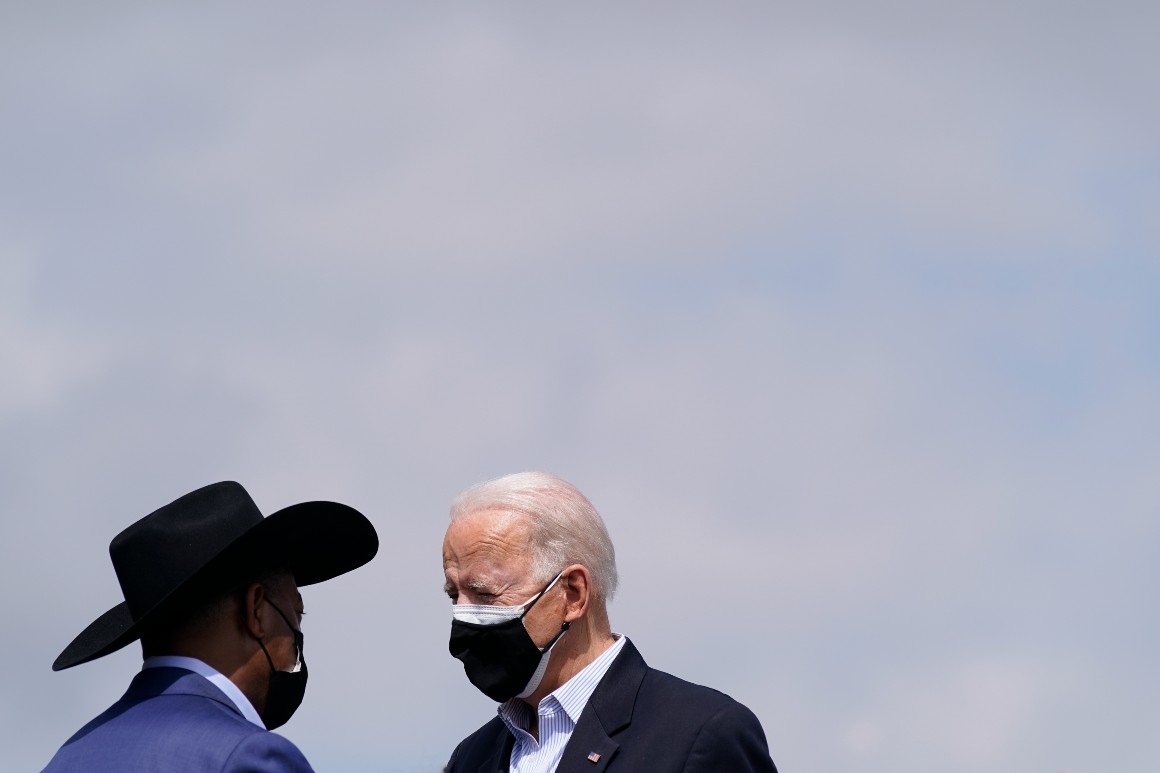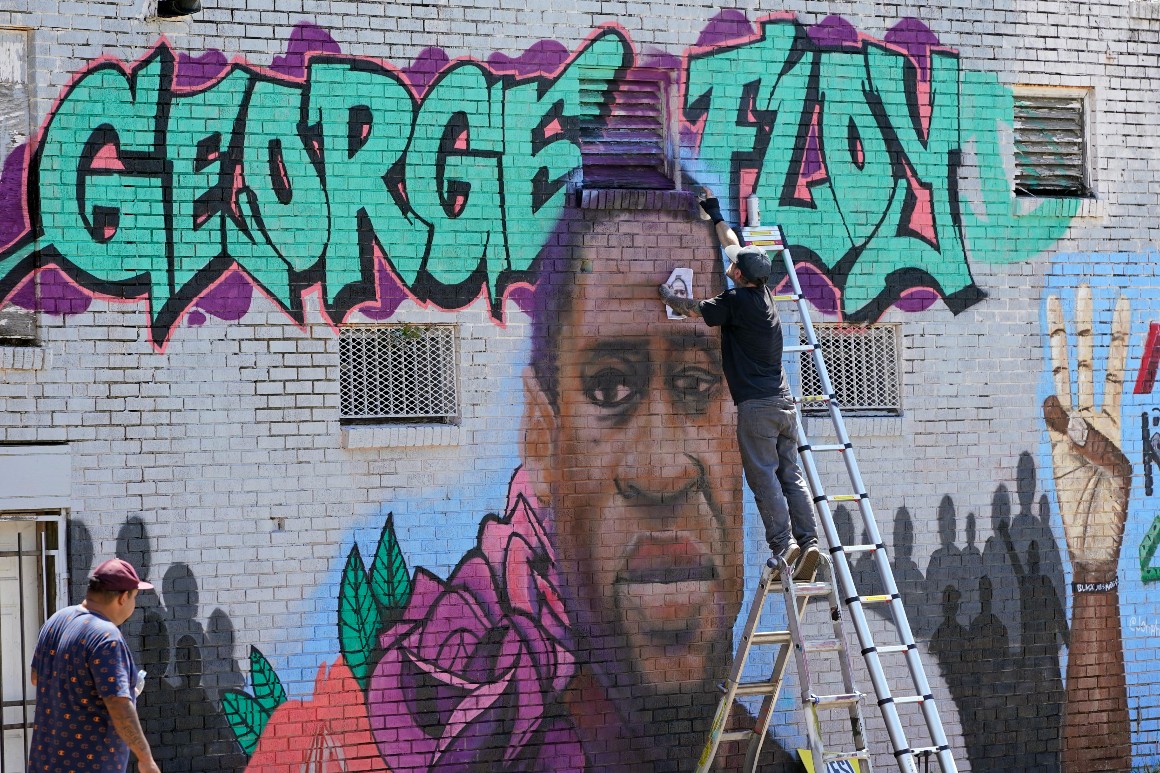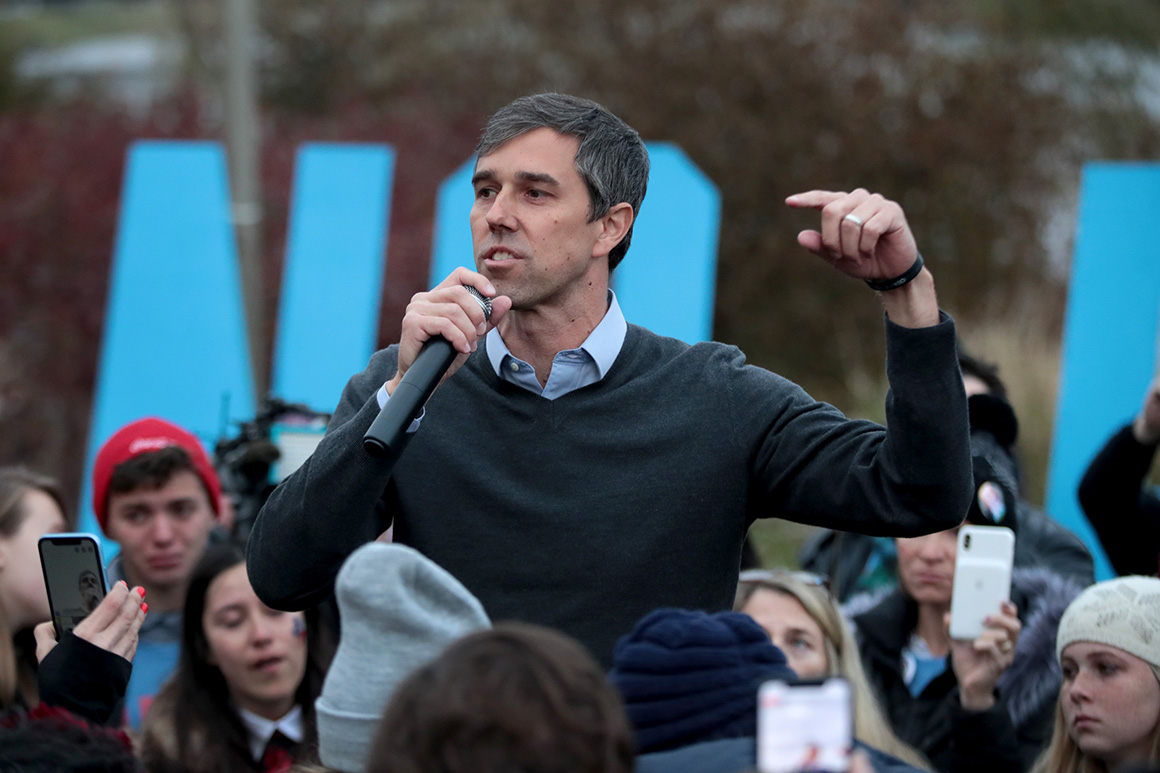Last month, in the middle of a dramatic surge of Covid cases across the country, Houston Mayor Sylvester Turner ordered city employees to either get vaccinated or face a twice-monthly testing requirement.
The policy was Turner’s latest rebuke of Texas Gov. Greg Abbott’s attempts to keep the state’s cities and counties, many of which are majority Democratic, from instituting pandemic- related restrictions and public health mandates. In August, Turner required city employees to wear masks in direct opposition to another Abbott order.
For nearly a year and a half Abbott, who is facing a Republican primary challenge from the right next year, has attempted to win over a vocal group within his party that opposes all pandemic measures. That’s meant Turner, who runs the country’s fourth most populous city and Texas’ most populous, is often openly defying the state government in Austin.
“Quite frankly, I think more people have come down with Covid and more people have died because the hands of local government officials have been tied by the state,” Turner, who spent more than 25 years as a Democratic state representative in the Texas House, said in a wide-ranging interview last week.
The pandemic is just one flashpoint between majority Republican state lawmakers and major Texas cities, which are largely run by Democrats. Houston, a place that spans more than 600 square miles and has more than 2.3 million residents, has become an especially frequent target of the conservative state legislature. In a special session this year, state lawmakers passed a bill that now prohibits many pandemic measures that Houston’s Harris County put in place during the last election to ease voting.
POLITICO spoke with Turner over Zoom about running a majority Democratic city in a Republican state, why he doesn’t believe in defunding the police and who he hopes will run in next year’s Texas governor’s race. This conversation has been edited for length and clarity.
How is Houston’s relationship with the state government?
When I came into office in 2016, the number one issue we were facing, financially, was the rising cost of unfunded liabilities in our pension system in the city of Houston. But our pension system is statutorily housed out of Austin. Whatever reforms we came up with locally, we had to get approved by the Legislature. We came up with a Houston plan and then we got the support of the Texas House, the Texas Senate, and the governor ended up signing the bill. That is what I call collaboration at its best.
Since that time, which was in 2017, it has been challenging because there have been measures passed by the Legislature that placed a revenue cap on local governments. There have been attempts, for example, to restrict the lobbying efforts of local governments. That has not been successful, which is good. There have been restrictions placed on what local governments can do even on permitting.

You have announced that city of Houston employees must get vaccinated in defiance of Abbott’s orders. Has the state cracked down on the city?
Maybe it’s the way we chose to do it. What we have said to our employees is that you have to be tested on a [biweekly] basis. But if you are fully vaccinated, you don’t have to go through the testing. It’s not necessarily mandating vaccinations. There were some rumblings as to whether or not the state was going to step in and challenge us on that. But up to this point, that has not been the case.
The governor and the state have made it much, much harder [to tackle the pandemic]. In May of 2020, the governor stepped in, took away tools that we could use locally. He’s preempted us on a number of different levels. We’ve had a number of surges that have occurred where the governor said to counties and cities, you can’t do A, B, C or D.
It’s made the messaging more conflicting.
Have you talked to the governor about these issues?
We had a few conversations at the beginning of this pandemic. I don’t believe I’ve talked to the governor at all this year, with one exception. When President [Joe] Biden came to Houston, we spoke very briefly. That’s unfortunate. These are just different and challenging times. I was in the Legislature for 27 years and some of my closest friends are people on the other side of the aisle. This is just a different time.

The state legislature passed a new election law this year, with many provisions that take direct aim at measures put in place in Harris County, which includes Houston. What will the impact on the city be and how do you plan to counter that impact?
I’m going to borrow what my grandmother and mother used to say from the Bible: What was intended for evil, worked to our good. I’m hoping that will be the case here, what was intended to restrict and suppress people’s right to vote, hopefully will propel people to go to the polls. And not just people of color. It’s my hope that Democrats, Republicans, independents, people with disabilities, women, you name it, will step up.
We are using all of our mechanisms to encourage people to be registered to vote. The educational and awareness components are very, very important. Then to remind them that you don’t just vote in a presidential year. It is our hope that we can energize people to go to the polls in 2022.
Then the appeal is to the people in Congress. It is my hope that Sen. [Joe] Manchin and Sen. [Kyrsten] Sinema, that they will step up and pass the Voting Rights Act.
Last year George Floyd’s death led to a racial justice movement that swept the country. Do you think Houston has made progress on some of the goals of that movement?
Immediately after the murder of George Floyd, I put forth the mayor’s task force on police reform. They came up with about 104 recommendations. [We made progress on] anywhere between 60 to 70 percent. With regards to reshaping our independent police oversight board, we’ve done that. We set up five transparent dashboards, interactive, where you can file anonymous complaints. You can do it online in five different languages.
They made recommendations on appointing a deputy inspector general, separate and apart from the police department, that would work to investigate complaints. They said we needed to provide deescalation training. We need to report the use of deadly force, put in policies where police officers have an obligation to intervene if they see another police officer doing something wrong. All of those things are now in place.
They said we need to address crisis intervention. We have appropriated at least $25 million over the next three years for crisis intervention. If it’s a person dealing with mental behavioral health issues, we try to send counselors and mental health specialists and not just police.

Houston, though, boosted funding for its police department using pandemic relief funding. Why do that?
I marched in the largest protests, a march that we had after the murder of George Floyd. Quite frankly, I wasn’t hearing people say ‘defund police.’ I heard them say that we should not just place our funding in law enforcement, but we should be investing in communities that have been underserved, under-resourced for decades. And that’s what we are doing in this city.
When I came in, I said I didn’t want to be the mayor of two cities.
At the same time, in the city of Houston, we have 5,300 police officers. We need even more. The goal is to make sure that our communities have the law enforcement resources and presence that’s needed to serve them. And the two need to be on the same page working together to address crime and other elements.
I tell people, let’s not get confused. It’s not about dismantling or reducing law enforcement, but it’s making sure that we are investing in real ways, in real dollars, in communities that have been underserved and under-resourced.
Houston is the country’s energy capital and you’ve talked about the importance of the switch to renewables. But jobs in renewable energy are often lower paying than in oil and gas. How do you think Houston will drive that change and are you worried about the political consequences of disrupting the city’s economy?
It’s about making sure we’re in a position to continue to wear the energy capital crown. Yes, we’re the energy capital of the world, we’re proud of it. I don’t run away from the energy industry, but it’s about working collaboratively to move the energy sector forward. We’re not burying our head in the sand.
Now we want to lead an energy transition. There are a number of things that are taking place right here because we recognize we have some of the largest emitters in the world headquartered in Houston.
Our Resilient Houston plan was underwritten by Shell. Our climate action plan was underwritten by CenterPoint Energy. In one of our low-income communities, there was a landfill that left 240 contaminated acres over the last 50 years, that’s been pulling down this primarily African American community. We are working with our energy sector to turn those 240 acres into the largest urban solar farm in the country, enough to power 5,000 homes, take 120 million pounds of carbon out of the air annually, invest $70 million in those communities and provide green, equitable jobs in this low-income community.
What happens here can have not only local benefits, but the benefits can be global. [We] have nine to 11 major energy companies that are now engaged in carbon capture utilization and storage that can take literally millions of tons of carbon emissions out of the air. I’m also working with a number of these energy companies to engage in a major recycling program as it relates to plastic.
Have you talked with Beto O'Rourke about whether he will run for governor?
You know, in fact, he called me a week or so ago. I’ve been busy, but I intend to call him back.

You ghosted Beto!
I’m glad you brought it up because I do owe him a call. I like Beto and hope he will run.
Would you consider a run for governor?
Look, it took me three times to become mayor of Houston. Not one, not two, but three. People believed in me enough to ask me to serve, and I’m going to honor my commitment to the very last day. I’ve got the best gig that one could have, and I have the privilege of serving the very same city which I was born and reared. In spite of all the challenges that we have faced, our challenges on the state level, I’m staying put.
----------------------------------------
By: Renuka Rayasam
Title: The Texas mayor who’s fighting back against Abbott
Sourced From: www.politico.com/news/2021/10/27/houston-texas-mayor-turner-fights-abbott-517237
Published Date: Wed, 27 Oct 2021 03:30:34 EST






